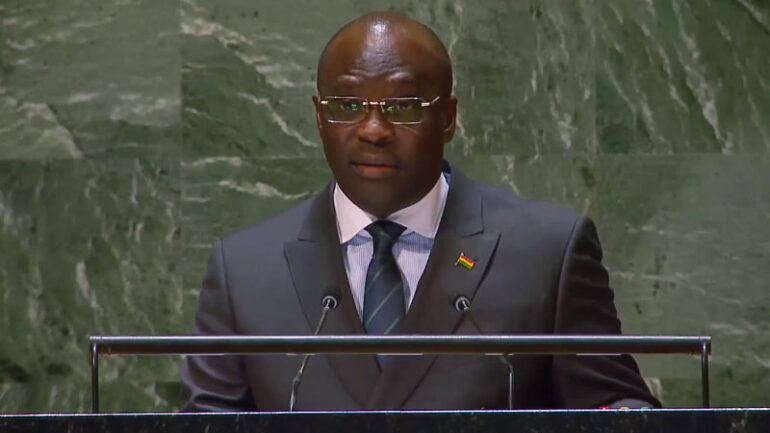Remarks at United Nations General Assembly: 74th plenary meeting, 78th session

- Posted by admin
- Posted in News, Statement & Remarks, UN News
Ambassador Harold Agyeman
Ghana’s Representative
to the United Nations
May 01 2024
Mr. President,
Today’s meeting, as a result of the use of the veto by a permanent member of the Security Council, is regrettable, and highlights, once again, the strong concerns Ghana and many other countries have with the continued maintenance of this anachronistic privilege that has been often been wielded to frustrate democratic decision-making in the Security Council and the collective approach required for maintaining peace and security in an evolved world order.
The recent veto against the admission of the State of Palestine into full membership of the United Nations has come against the crosswinds of the overwhelming aspiration of many to see the State of Palestine as a full member of this Organisation. While some States yet still refuse to acknowledge the statehood of Palestine, 140 Member States, including Ghana, recognise the State of Palestine. Its admission into the United Nations should therefore not be confused with the recognition of its statehood nor of its inalienable right to self-determination.
We remain unconvinced by the rationale given for the dissenting vote in the Security Council, and for Ghana, which recognised the State of Palestine on 29th November 1988, we are not in doubt that Palestine’s eventual full membership of this Organisation would have a positive impact on sustainable peace and global stability, based on its full and unhindered contributions and adherence to the purposes and principles of the United Nations Charter.
Indeed, while we note many missteps that may have been taken on the Palestinian question, in the past, the original commitment of the international community on 29th November 1947, to see the existence of the States of Israel and Palestine, living side by side, within secure and recognised borders; and with a shared understanding of mutual security, should serve as a strong motivation to right the wrongs of the past and for a more hopeful future for the Middle East.
Mr. President,
The Middle East, as we all see, is yet again on the brink and the unresolved situation of Palestine is the major fault-line that continues to create fragilities for the entire region and beyond.
In the view of Ghana, therefore, we all have a responsibility to help the parties reverse their course and must muster a unified resolve to support an immediate and permanent ceasefire and the full and unconditional implementation of Security Council resolution 2728 and other relevant resolutions, as well as for the unconditional release of all hostages, the enhancement of actions to give true meaning to the commitments for the provision of large-scale humanitarian assistance in Gaza and the guaranteeing of the safety and security of all humanitarian personnel.
The toll of the war in Gaza since 7th October has been devastating and its prolongation is unacceptable. We are particularly distressed by the emerging details of the mass graves that have been found around the Nasser Hospital and the Al-Shifa Hospital following the withdrawal of the IDF. We support the call for an independent international investigation of this worrying incident and for the attribution of accountability, as may be necessary.
Ghana is also particularly concerned by the growing regional implications of the conflict in Gaza. We deplore the recent cross-border incidents, which have escalated tensions and insecurity in the region and threatened global peace and security. We have studied footage of the retaliatory missile attacks of 14th April and their trajectories and inherent capabilities and use this occasion to urge a firm de-escalation of tensions.
We strongly appeal to the countries of the Middle East to prioritise the stability of the region above everything else and reset, in due time, relations for a neighbourhood of peace, tolerance, and respect for the territorial integrity of one another. We also urge the friends of the region to assume postures that would not upset the balance of power in the region as such efforts would not enhance deterrence or serve the cause of peace.
President,
Without a doubt, the question of Palestine is complex and its resolution complicated, but it is also a situation that we must have the courage to objectively confront, mindful of the history of the region and the aspirations of the two nations for peace, stability, and security.
11. As a peace-loving country that maintains relations with both the State of Israel and the State of Palestine, Ghana renews its call for peace in Palestine, and beyond the State of Palestine’s admission into the United Nations, urges a revitalisation of the peace process to address mutual concerns that neighbouring States should necessarily resolve. The dark clouds that presently hang over the Middle East skies are ominous, and we all must do what we can to bring about a brighter horizon.
I thank you for your attention.
